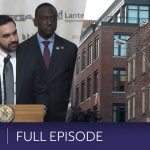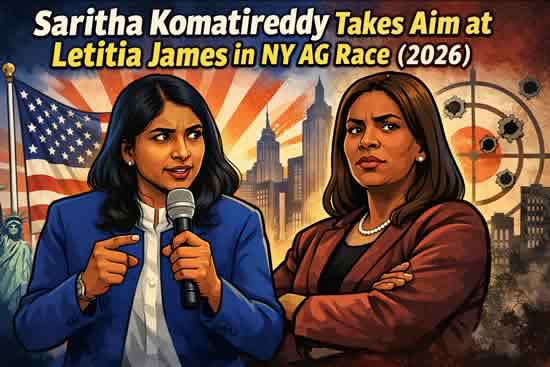Mayor Eric Adams, reflecting on a year of challenges during an interview on “Up Close,” discussed his administration’s efforts to combat subway violence, homelessness, and mental health crises while defending his hiring decisions and leadership amid legal scrutiny. Despite facing federal charges and criticism, Adams highlighted achievements such as declining crime rates, record-breaking tourism, and economic recovery. Maintaining an optimistic outlook for 2025, he emphasized his commitment to tackling affordability, education, and public safety, vowing to continue fighting for the resilience and progress of New York City as he prepares for re-election.
Bill Ritter: Lots to talk about this morning with the 110th mayor of New York, Eric Mayor Adams, who has had quite a busy year for himself this year, and what promises to be another busy year as he runs for re-election while trying to fight federal criminal charges.
And good morning, everyone. Welcome to the last “Up Close” of the year. I’m Bill Ritter, wishing you and your loved ones a healthy, happy new year. Our guest this morning, the 110th mayor of New York City, Mayor Eric Adams. What a busy year indeed it’s been for the city and for the mayor, politically and personally, and there has been no shortage of challenges for the city or for the mayor. For the third consecutive year, I sat down with the mayor and talked about the year behind and the year ahead.
Mr. Mayor, thank you for joining us on “Up Close” once again for our year-end look at what has gone on and what’s going to go on in the next year. Thank you for joining us.
Mayor Eric Adams: Thank you. Always good to be on with you.
Ritter: And good to talk to you as well. I do want to talk to some news stories that are happening right now. There was a pretty terrible murder on the subways this last weekend, and I wanted to just talk to you about it, get your take on what’s happening there. The woman who police believe was homeless was set afire while she slept on the subway.
What is going on? I know you don’t approve of that, but we got to do something about people who are homeless sleeping on the subways as well. What’s your take on all this?
Mayor Adams: And Bill, and when you think about it, this is an intersectionality of the things that I have been talking about, and I really need assistance from my other partners in government.
First, something is clearly wrong with a person that was set, an innocent individual, on fire, a woman, and sit there and watch her burn. Something is wrong with that. And then you look at the fact that this person was snuck into the country after being removed from the country, where my preliminary reports are giving me. I’ve been talking about this over and over again.
And lastly, the subway system is not a place for people to sleep on. They should not be assaulted because they were on the subway system. But we have an obligation to do something about it, and that’s what we’ve been doing with SCOUT and PATH. But you know, those advocates who are stating that people should have a right to sleep on the subway, sleep on the streets, they are just wrong.
And that’s what I’ve been fighting against.
Ritter: The governor has set up another 250 National Guards members to patrol the subways. There are a lot of people who think we just need more cops. We’re short cops by about 4,000 if my numbers are right. Police officers and about 2,000 detectives. Is that a way to stop crime better than having the National Guard there?
Mayor Adams: Well, we have partnered with the governor since the beginning when we did our subway safety plan and we saw a decrease in the violence in our subway system. And the subway system continued to get safer and safer every day. Even robberies are at the lowest level in history from the last numbers I looked at.
Here’s where we are. Omnipresence, the presence of a uniformed officer, it does the role of making people feel safe and fight crime at the same time. Bill, we have about 4.5 million riders a day. We have six felonies a day on average a day. And so it’s these high profile cases that strike out our psyche and make us feel unsafe. And that’s what I’m fighting against every day.
Ritter: Right. And the question is whether the numbers may be going down, but the perception is what gets people.
Mayor Adams: Right. Because an incident like this or an incident when someone shoves someone to the subway track or a random act of violence, that plays on our psyche. And connected to those random acts and what is overshadowing our success are those who are dealing with severe mental health illnesses. And that is why we’ve been fighting in Albany to get the right to do involuntary removal. We need these bills passed so that we can get the support that we need to carry out the continuation of keeping our subway system safe.
Ritter: Lots of talk about it, Mr. Mayor. I’m glad you’re here to do it. Let’s talk about the latest news story, too, as well. Another one of them recently, Jeffrey Maddrey, the [chief of] department of NYPD, its investigative chief of the entire department. The highest ranked uniformed officer has retired after a scandal that, I would say, is one of the biggest scandals and not the biggest scandal that has been here for the last three decades, at least.
Mayor Adams: Troubling allegations and Commissioner Tisch is conducting her internal review and whatever external review is going to take its course as well. I have to keep moving the city forward. And that is what I’m focusing on doing. And I’m allowing those investigators to do their job to find out exactly what happened here.
Ritter: If you believe all the news things that we’ve had stories that we’ve done on this story, you know, a friend of yours, a guy who is you know, people seem to like a lot and had a lot of respect for got involved in some sort of a sex thing with his secretary.
And you know, what happens when that gets public? What happens when people find out about that? What happens when all that becomes disclosed? And what happens to the NYPD by all that?
Mayor Adams: Well, and I think that you said something that we know knowns and we know unknowns in the knowns that I’ve known that I’m aware of is a person who served this city to protect this city. The unknowns none of us know. And only after proper review, will the unknowns be discussed and determine what happened. Our job is to allow those who are doing the review to do it without any interference at all. And I’m not going to do anything to interfere with coming to the truth in this manner.
But while this is happening, I still have to deal with the everyday issues, affordability, housing, public safety, educating children, and revitalizing our economy. And that’s what I must focus on and allow the reviewers investigators to determine what happened and the unknowns, particularly those that I’m not aware of.
Ritter: With all due respect, Mr. Mayor, people say you’re still smiling. You have this optimistic viewpoint. And yet, we know, you know, that you’ve had a rough year. You were indicted to rough to say the least. You were indicted. You say you’re not talking about it. If you’d like to begin to talk about it up close right now. Go ahead.
If not, how are you doing this? How do you keep your optimism or seeming optimism? You’re smiling, even when you may not want to smile. This has affected you, I’m sure. A lot of these people were your friends who are no longer in office.
Mayor Adams: Yeah, and so true. You know, in life, there are painful moments. And, often people often hear me reflect on watching the painful moments that my mother went through. Everyone knows that I call myself a mama’s boy. And she has some difficult times in life. You know, Bill, I talk about, you know, many mornings walking past her door at night and, you know, hearing her crying, wondering we were going to be thrown out. But mommy got up every morning and she did her job.
And I’m watching the mothers and fathers of this city that go through hard times. You know, like how does someone get up the next day after preparing to marry someone just to have them murdered in a car accident? How does a mother get up after losing two children to gun violence like Jackie Adams?
You have to continue to get up one foot in front of the other. And there’s going to be some very difficult days. And this was a difficult year for me on many levels and it was hard. But New Yorkers are resilient. Let me tell you what else was hard. But it was hard watching 9/11 and those two buildings collapsed before our eyes and thousands of New Yorkers [had] died. But you know what? On 9/12, we got up.
We got up. And I have to continue to get up because New Yorkers are dependent on me. They voted for me. And I’m going to continue to deliver for this city, no matter what I’m faced with. And so people were calling for me to step down. I stepped up and we got City of Yes passed. We continue to bring down crime, reversing the devastation of our economy and protecting children. I’m going to continue to do that as long as I have to.
Ritter: Alright, let’s just take a look at who you are. You’re very loyal. There’s no question about that. You hired a lot of people who are your close friends. If you had to do it over again from the benefit of hindsight, would you do that again?
Mayor Adams: Well, first of all, life is not what happens in the rearview mirrors in the front window. And let’s be very clear, because I think it has been overstated. I believe all of us bring into our circles those we have been with. It’s not so much close friends, as those who I observed for years who have done great things in government. And that’s what we all do.
People hire those who are part of their law firm or went to their law school together. People hire people who were in the profession. I went through those who I knew who were committed. Sheena Wright was committed for years and did a great job. Phil Banks was a former deputy mayor, did a great job. And so when you look at the small number of people who were left, my commission is still intact, Bill. Not only that, my deputy mayors are still here. I only lost one deputy mayor [who] decided to leave.
And so the appearance that we’ve hemorrhaged talent is just not true. But I can’t argue with the narrative that people have. I have to continue to build the case of how we turn around the city. And yes, I will continue no matter what job I do. I’m going to look for those I’ve known throughout my journey who have been dedicated and committed to the work that I need done. And I will hire them if they’re friends or not friends. I will hire them and bring them on.
Ritter: Let’s talk about Luigi Mangione. When he arrived here, back here again, in an airplane and then a helicopter from that with the New York Police Department escorting him after he was arrested in Pennsylvania, here to go to court and be tried in federal and state court. You were with him. You were with him. And when he arrived in court, his attorney said you were staging something. You were just doing a stage. That’s all this was, it was for television. How do you respond to that? And why were you there that day? You were right behind him.
Mayor Adams: Yes. And I was staging something. The attorney. That’s his analysis. Yes. Being mayor is substantive and symbolic. The substantive issue is bringing down crime, making the city safe, educating our children. That’s the substance to it. But there’s symbolism.
Days before his return, I communicated with a large number of executives and CEOs from IBM, Deloitte and other corporations. I wanted to send a strong message to those CEOs and the financial institutions in this city that that attentional assassination struck at the core of the financial stability of this city in the fear. And so I needed to be there to say to them and other New Yorkers that we will not tolerate and accept violence of this nature. I don’t care if it’s a normal street mugging or if it is an intentional assassin. And so I think the attorney should focus his attention on the actions of his clients.
So, yes, that was it. That was a symbolic moment that I was saying to the people of New York is this person struck at the heart of our safety. And I wanted to be there when he came back to the city.
Ritter: Okay, you know, people were on both sides of that. There were people who said, hey, look at that guy go. And there were other people like a lawyer who said that. So I appreciate your candid answer.
Let me talk to you about timing. You said what’s the timing about? A lot of things are timing when you’re in a news business. Right now, we’re timing something with you. You are busy timing. What did it mean when you asked that the court, the federal court push away your beginning of your trial date to after, coincidentally or not, Donald Trump was inaugurated again for a second term.
Are you tied to Donald Trump more than you were, let’s say, five months ago or a year ago? And are you hoping that he somehow pardons you if you are found guilty?
Mayor Adams: Well, let’s break that into two pieces. First, look at my conversation that I stated, Bill, pre-presidential election. Look at what I’ve been saying about going after violent migrants and asylum seekers that are creating violence on our streets. I was saying that before knowing who the next president was. Affordability before the last election stopped the radicalization of our children, pre-election.
Everything I’ve said pre-election, I’m saying post-election. And for people to state that Eric is changing his conversation based on who’s the president, that is just not true. I’m the same person fighting for working class people of this city and this country that I was doing pre-election, I’m doing post-election.
Ritter: Are you are you hoping that he gives you some sort of pardon if you’re found guilty?
Mayor Adams: Here’s what I’ve said pre-election and I’m a post-election. I did nothing wrong. I should not have been charged. I believe I was targeted because of my stance to protect the city from the migrants and asylum seeker issues that we were facing. And I have a legal team that, we’re going to pursue every avenue to get the justice that I deserve. And that is the job of my legal team. But I’m the same person that you elected, the people of the city elected in 2022 to be the mayor. I stand for working class people of this city that they should be able to move into the middle class and provide for their families.
Ritter: Okay, you have behind you, if I can switch gears a little bit, you have behind you, it looks like a trash can. And you’re an optics guy. So tell us what the trash can is doing behind you.
Mayor Adams: It is our symbol of our war on the filth and dirt that we saw in our city, containerizing our garbage. 70 percent of New Yorkers now have to put their garbage in containers. That’s an amazing feat. No one thought it was possible. They thought it was going to take us five years to do so. We did it in a rapid fashion.
Our rat czar and the former DSNY commissioner, what they did on our war on rats, you know, rats shake up New Yorkers all the time. It’s a symbol of urban decay. And so that trash can is, again, the symbol of how we not only clean up our streets from crime, but we’re also cleaning our streets up from the trash revolution that we are experiencing.
Ritter: And if it leaves fewer, you know, rodents, then I know that you’re behind that and you’re in favor of it. I appreciate that.
Let’s talk very briefly about the economy. Where does it stand right now? We talked when you were elected, when you were running for election, we talked about you and I did about what happens to get people back who have some money to push some money inside this economy.
Are we doing that up to par? How do you get more people, middle income people, upper middle-income people not talking about billionaires? How do you get more of those people back in from where they once lived?
Mayor Adams: Well, you know, number one, to get them back into the offices, you’re seeing that take place. You’re seeing more private sector jobs and more public jobs, more small businesses have opened. We have broken records on the largest number that have returned. The employment pool, we decreased unemployment among African-Americans by over 20 percent and also Hispanic New Yorkers, I should say, by close to 30 percent.
Our tourism which feeds a great portion of our economy. We have the second largest tourism in the history of the city. Close to 65 million tourists have visited this city. You are seeing the revitalization of the economy. What we did on the Fifth Avenue announcement, billions of dollars are put into Fifth Avenue employees. When you revitalize Fifth Avenue like we’re doing and getting shoppers to come in and spend. And so we’re finding a host of creative ways to really move everyday New Yorkers into the middle class. And we have been successful doing it over and over again. We will continue to do so.
Ritter: And a lot of people were pleasantly surprised when they got those numbers. They were surprised that tourism was so high.
I want to leave this last minute or so, a minute and a half to talk about what you have looking forward. This was a tougher year than anyone might have imagined for you personally. You tried to not talk about this and do your job. What do you look forward to in terms of your vision for being mayor and for you personally, because you have some personal struggles happening with the trial coming up in 2025?
Mayor Adams: I’m excited. Someone sent me a note the other day that I get two gifts every morning. The gifts of both my eyes opening. That’s the gift of life. And I’m not going to squander that gift. And I’m going to continue to show New Yorkers resiliency in the face of challenges.
It was challenging having to get over COVID. It was challenging spending $6.5 billion that should have gone to taxpayers during the migrant, asylum seeker crisis. It was challenging the fire that we lost a large number of our city residents in the Bronx when I first came into office. Challenging what happened with Officer Mora and Rivera, watching those two young officers killed in the city. So there were a lot of challenges that I faced. But I am really hoping that New Yorkers look at me in the face of challenge. They can see that I’ve always maintained hope.
And I’m optimistic about 2025 not only for my personal journeys but for the journeys of everyday New Yorkers that I meet on the subway system in the hospitals on our street corners in our stores. I’m optimistic about 2025. They wanted a mayor that was going to fight for them and every day I fight for New Yorkers.
Ritter: 110th mayor of New York City Eric Mayor Adams, good luck Mr. Mayor. I appreciate you coming on. Happy new year, peaceful new year, healthy new year, and we’ll see you as things unfold.
Thank you joining us.
Mayor Adams: Thank you and take care.
December 29, 2024 New York
Sources: NYC.gov , Midtown Tribune,
Big New York news BigNY.com














